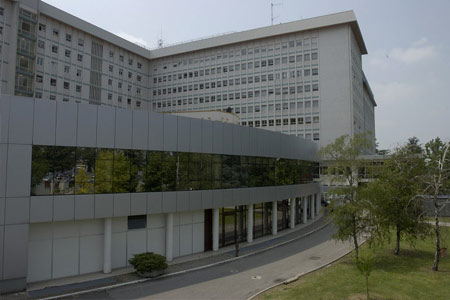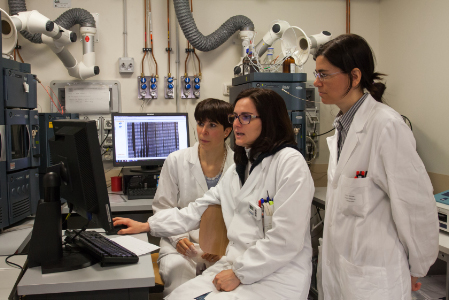- Authors:
-
Passaro, Antonio; Prelaj, Arsela; Bonanno, Laura; Tiseo, Marcello; Tuzi, Alessandro; Proto, Claudia; Chiari, Rita; Rocco, Danilo; Genova, Carlo; Sini, Claudio; Cortinovis, Diego; Pilotto, Sara; Landi, Lorenza; Bennati, Chiara; Camerini, Andrea; Toschi, Luca; Putzu, Carlo; Cerea, Giulio; Spitaleri, Gianluca; Cappuzzo, Federico; de Marinis, Filippo
- Title:
-
Activity of EGFR TKIs in Caucasian Patients With NSCLC Harboring Potentially Sensitive Uncommon EGFR Mutations
- Year:
-
2019
- Type of item:
-
Articolo in Rivista
- Tipologia ANVUR:
- Articolo su rivista
- Language:
-
Inglese
- Referee:
-
No
- Name of journal:
- CLINICAL LUNG CANCER
- ISSN of journal:
- 1525-7304
- N° Volume:
-
20
- Number or Folder:
-
2
- Page numbers:
-
e186-e194
- Keyword:
-
Complex mutations; Exon 18; Exon 20; Lung cancer; Tyrosine kinase inhibitors; Adult; Aged; Aged, 80 and over; Antineoplastic Agents; Carcinoma, Non-Small-Cell Lung; ErbB Receptors; Exons; Female; Humans; Lung Neoplasms; Male; Middle Aged; Mutation; Neoplasm Staging; Protein Kinase Inhibitors; Retrospective Studies; Survival Analysis; Treatment Outcome
- Short description of contents:
- BACKGROUND: Molecular characterization of non-small-cell lung cancer (NSCLC), defined predictive and druggable mutations that greatly modified patient prognoses. The most frequent driver mutations detected in NSCLC are epidermal growth factor receptor (EGFR) mutations, accounting for approximately 90% of exon 19 deletions and exon 21 point mutations. The other EGFR mutations are classified as uncommon or nonclassical and include exon 18 point mutations, exon 20 insertions, and combined mutations, which present different sensitivity to tyrosine kinase inhibitor (TKI) targeting. PATIENTS AND METHODS: We collected data from EGFR TKI-naive patients with metastatic NSCLC, harboring EGFR exon 18 mutations and EGFR combined mutations treated with first- or second-generation EGFR TKIs. Efficacy end points were evaluated considering the activity of EGFR TKIs in exon 18 versus double-mutation EGFR groups. RESULTS: Eighty-eight patients harboring uncommon EGFR mutations were evaluated in our analysis, and subdivided into 2 group: complex mutations (cohort A = 46 patients) and double mutations in exon 18 (cohort B = 42 patients). The results showed a median progression-free survival of 8.3 versus 12.3 months (hazard ratio [HR], 0.65; P = .06) and a median overall survival of 17.0 versus 31.0 months (HR, 0.62, P = .04) favoring the EGFR combination group. Within the combination group, no detrimental effect was associated with exon 20 mutations. CONCLUSION: Our study confirmed that EGFR exon 18 and combination mutations might be considered potentially sensitive uncommon mutations, with a similar survival compared with the well known common EGFR mutations. Comparative analysis showed that patients with complex mutations achieved longer survival compared with the exon 18 group, without correlation with the presence of exon 20 mutations.
- Product ID:
-
109536
- Handle IRIS:
-
11562/997933
- Last Modified:
-
November 18, 2022
- Bibliographic citation:
-
Passaro, Antonio; Prelaj, Arsela; Bonanno, Laura; Tiseo, Marcello; Tuzi, Alessandro; Proto, Claudia; Chiari, Rita; Rocco, Danilo; Genova, Carlo; Sini, Claudio; Cortinovis, Diego; Pilotto, Sara; Landi, Lorenza; Bennati, Chiara; Camerini, Andrea; Toschi, Luca; Putzu, Carlo; Cerea, Giulio; Spitaleri, Gianluca; Cappuzzo, Federico; de Marinis, Filippo,
Activity of EGFR TKIs in Caucasian Patients With NSCLC Harboring Potentially Sensitive Uncommon EGFR Mutations
«CLINICAL LUNG CANCER»
, vol.
20
, n.
2
,
2019
,
pp. e186-e194
Consulta la scheda completa presente nel
repository istituzionale della Ricerca di Ateneo 








